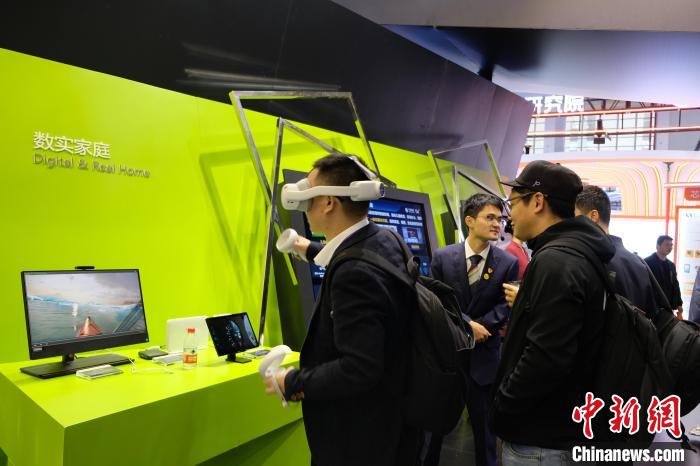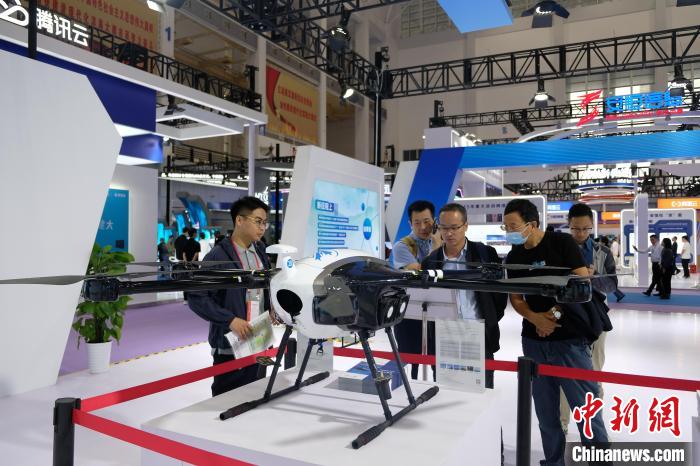China News Service, Ningbo, October 16 (Reporter, Lin Bo) walked into the Eastern (Beilun) Base of Dongfang Cable and the Digital Future Factory. From production to shipment, from workshop to dock, the photoelectric composite submarine cable realizes real-time monitoring and sharing of data throughout the production cycle… This is the silhouette of Zhejiang’s "digital-real integration".
The report of the 20th National Congress of the Communist Party of China states: "Accelerate the development of the digital economy, promote the deep integration of the digital economy and the real economy, and build a digital industrial cluster with international competitiveness." More and more enterprises are also realizing that the integration of data and reality is an inevitable choice to promote the transformation of manufacturing to high-end "intelligent manufacturing".
As a leading province in the development of the digital economy, Zhejiang has deeply implemented the "No. 1 Development Project" of digital economy innovation and quality improvement. What are its achievements in the integration of digital and real development?
Deep Integration of Numbers and Realities: Reshaping Thousands of Industries
"Emphasis on integration empowers, and new breakthroughs have been made in the deep integration of numbers and reality." Li Min, a member of the party group, deputy director and first-level inspector of the Zhejiang Provincial Department of Economic and Information Technology, said that the province pioneered and promoted the new paradigm of "industrial brain + future factory" integration and development. The industrial brain in 45 industrial fields has cumulatively served 120,000 enterprises, reducing costs by about 13% and improving efficiency by about 23% on average for enterprise users.
Taking Hangzhou and Ningbo as examples, the two cities were selected as the national pilot cities for the digital transformation of small and medium-sized enterprises, and a total of 601 smart factories (digital workshops), 52 future factories, and 535 provincial industrial Internet platforms were built.

Peter Major, Vice Chairperson of the United Nations Commission on Science and Technology for Development, said at the 2023 World Digital Economy Conference and the 13th Smart City and Smart Economy Expo (hereinafter referred to as the "Digital Economy Conference") held in Ningbo recently that the integration of data and reality not only has a revolutionary impact on industrialization and production, but also plays a key role in reshaping the bright future of mankind. People from all walks of life around the world should carry out in-depth cooperation based on digital opportunities to promote the safe and efficient development of the digital economy and achieve the goal of sustainable development.
5.5G technology senses low-altitude drones, the Asian Games "conspicuous bag" robot dog reappears, and the self-developed Feitian cloud computing operating system debuts… Through this digital economy conference, it can be seen that the ever-changing new technologies are accelerating the reshaping of thousands of industries, profoundly affecting people’s production and life.
As a major foreign trade city and a developed area of private economy, Ningbo has many small, medium and micro enterprises. How can small, medium and micro enterprises with large quantities and wide range seek innovation with "numbers"?
In order to enhance the overall cyber security protection capabilities of small and medium-sized enterprises and promote the construction of a cyber security social service system, the "cyber security" for small and medium-sized enterprises has been operated in Ningbo.
"Facing the current reality of weak cyber security protection for small and medium-sized enterprises, it provides a comprehensive and whole-process cyber security risk prevention and control plan, which is an active exploration and practice in the field of cyber security insurance in Ningbo." According to the relevant person in charge of the Ningbo Municipal Party Committee Cyberspace Information Office, as a national insurance innovation comprehensive pilot zone, the city uses financial means to participate in cyber security space governance, providing important support for the construction of digital Ningbo and a strong network city.
Digital technology empowers: injecting surging new kinetic energy
From manufacturing to intelligent manufacturing, the word "smart" highlights the change of digital-real integration. Digital-real integration also promotes the transformation and upgrading of traditional industries, spawns new industries, new business models, and actively builds a modern industrial system. The requirements of high-quality development run through the whole process of new industrialization.
Combining communication and sensing functions to provide ubiquitous sensing services for the intelligent world, the "Synaesthesia Integration" technology; the Internet of Things technology "Passive IoT" that collects radio waves emitted from the network side and captures and collects energy through technology; in addition to inheriting the native advantages such as 5G network slicing, it also has the advantages of easy connection, fiber-free wiring, low cost, high reliability and low latency. "RedCap New Standard"… This is the latest achievement of Ningbo Mobile’s "5G-A" technology.

According to Wang Yong, deputy general manager of Zhejiang Mobile Ningbo Branch, "5G-A" is a leap-forward upgrade from "enhanced connection" to "beyond connection", which not only deeply empowers the digital upgrading of traditional industries, but also expands the digital field from land to new spaces such as low altitude and ocean. It is expected to spawn new industries, new formats and new models in intelligent manufacturing, virtual reality, vehicle to everything, low-altitude economy, and smart Internet of Things, injecting surging momentum into the sustainable and high-quality development of the digital economy.
It is true that the development of digital integration cannot be separated from the support and empowerment of digital technology.
In recent years, Ningbo has actively seized development opportunities, actively promoted industrial transformation and upgrading with digital technology, and achieved phased results in the integration of digital and real development. Especially in terms of intelligent manufacturing, the city has built a pattern of "future factories" as the benchmark and wide coverage of digital transformation of small and medium-sized enterprises. Since the beginning of this year, 5 provincial future factories have been added (a total of 17), ranking first in the province.
In the "Future Factory" production workshop of Ningbo Consinee Group Co., Ltd., cashmere raw materials are put into the feeding port on the first floor, automatically transferred to the second floor to make yarn, and then weighed, labeled, packaged, boxed, and packaged into storage.
According to the relevant person in charge of the company, in this intelligent "black light" digital unmanned factory, orders can be automatically completed from delivery to factory production and quality control by simply placing an order in the control center. Production efficiency is increased by 20%, inventory turnover is doubled, delivery cycles are shortened by half, and the number of workers is reduced by half.
Traditional industries, such as the textile and garment industry, are being empowered by digital technology to inject "digital momentum".
Pan Yunhe, an academician of the Chinese Academy of Engineering and a professor at Zhejiang University, suggested that manufacturing enterprises in Ningbo and even China should actively promote product innovation and intelligence, so as to drive the coordinated development of the upstream and downstream industrial chains. Once Chinese enterprises create intelligent products through intelligent independent technology and group intelligent technology implementation innovation, related supporting enterprises will also flourish and lay the foundation for promoting new industrialization.
"Vigorous" works wonders: stimulate the vitality of data elements
Digital infrastructure is an important part of the development of the digital economy. Since the "Digital China" plan was announced, all localities have been increasing their efforts in digital infrastructure building.
The reporter learned that Zhejiang Province has successively issued the Interim Measures for the Opening and Security Management of Public Data in Zhejiang Province, the Regulations on Public Data in Zhejiang Province, and related supporting systems to provide institutional guarantees for the collection, full sharing, orderly opening, and safe use of public data in accordance with the law, and to stimulate the value of data elements.
Taking Ningbo artificial intelligence supercomputing center as an example, it was officially launched in January 2023, providing autonomous and controllable 100P (FP16) half-precision artificial intelligence computing power and 5P (FP64) double-precision high-performance computing power, filling the gap in supercomputing power infrastructure.
In practical applications, through the "strongest computing brain", it helped the meteorological department to carry out the application research of meteorological numerical models for sailing events during the Hangzhou Asian Games, reducing the forecast time from 9 hours to 4.5 hours, and successfully completed the event guarantee work.
Zheng Weimin, an academician of the Chinese Academy of Engineering and a professor of the Department of Computer Science at Tsinghua University, pointed out that computing power is the foundation of the digital economy. Whether it is the popular ChatGPT or the meta-universe based on AR, VR and other technologies, it is inseparable from its "vigorous miracle". Therefore, human society has entered the era of digital economy with computing power as the core productivity. It is recommended that the whole country strengthen the interconnection and unified scheduling of computing power to inject new momentum into economic growth. (End)